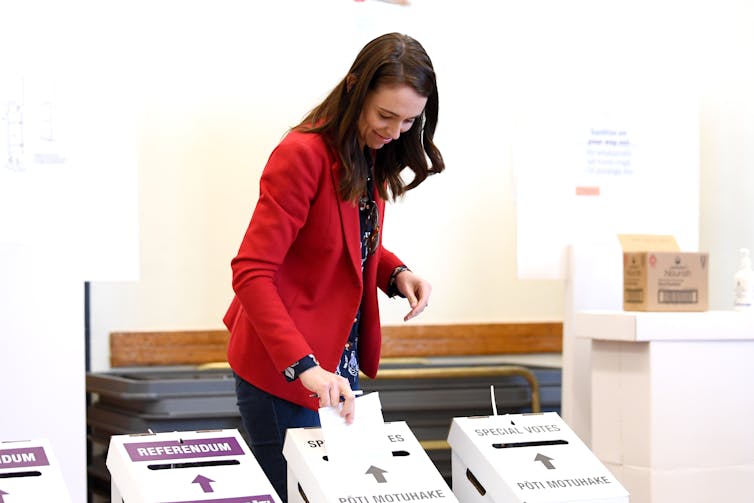How might record advance voting numbers influence the final outcome?
- Written by The Conversation
With under 48 hours until polls close in the 2020 election, 1,565,421 New Zealanders have made an advance vote[1]. This represents 60% of the total number of votes cast in the 2017 general election and is the most advance votes ever cast in a New Zealand general election.
Is it possible to read the tea leaves in these numbers and predict what’s going to happen on Saturday?
Earlier this century and facing plummeting voter turnout, the Electoral Commission surveyed non-voters as to why they had not cast a vote. Respondents said they simply forgot or were otherwise busy on election day, away or overseas.
To mitigate these factors, the commission has made it easier[2] for people to vote when and where it suits them. It has opened polling booths two weeks ahead of the election day in a range of locations, including school and church halls, mosques, marae, universities, clubrooms, libraries and pop-ups in retail spaces.
As a strategy to increase the total vote, this appears to have worked. Turnout has risen[3] from a record low of 74.2% of enrolled voters in 2011 to 77.9% in 2014 and 79.01% in 2017.
Advance voting is not the only factor in these statistics. Voter advice applications such as Massey University’s On The Fence[4] have helped first-time voters feel more confident about the voting process. This has led to higher youth voter turnout, contributing to the rise in overall turnout.
 Locking in the result: Jacinda Ardern votes in Auckland on the first weekend polls opened. GettyImages
Locking in the result: Jacinda Ardern votes in Auckland on the first weekend polls opened. GettyImages
Who benefits from advance voting?
Our major political parties have cottoned on to the advantages they can gain by promoting advance voting. Core major party voters tend to decide their voting choices well before the official campaign period. It’s therefore in major party interests to lock those votes in before random campaign events shake voters’ confidence in their choices at the last minute.
Parties only have to look back at the 2002 election to see the impact of this. When Labour entered the campaign it was hovering around 53% support. Following a random media storm[5] over genetically engineered corn, which blew over as quickly as it arrived, Labour’s vote dropped over ten points to 41.26% on election day.
It was therefore no surprise to see our major party leaders, Jacinda Ardern and Judith Collins, casting their votes[6] on the first weekend polls were open, projecting confidence and role-modelling the acceptability of advance voting. Green co-leader James Shaw and ACT leader David Seymour also voted that weekend, hopeful of locking in the opinion poll gains their parties had made in the middle of the campaign period.
Read more: NZ election 2020: 5 experts on the final debate and the campaign's winners and losers ahead of the big decision[7]
New Zealand First leader Winston Peters has said he will wait until tomorrow to cast his vote. On the grounds of “clanger after clanger after clanger being dropped every day now”, he has warned[8] “only a fool tests the water with both feet”. He has encouraged voters to wait until election day so they know all the facts before casting their votes.
This isn’t just Peters playing amateur philosopher. Currently languishing in the polls, it has never been more important for New Zealand First to discourage advance voting. Peters will know that many of his supporters in previous elections have been protest voters who opted for New Zealand First as a matter of last resort because they liked neither of the major parties’ offerings or leaders.
Unfortunately for the party, some of the clangers this week are own goals. News about the financial scandal[9] concerning the New Zealand First Foundation is more likely to hurt than benefit the party’s election fortunes this close to election day.
The impact of late strategic voting
At least a million voters are still to cast their votes today and tomorrow. History shows many will end up voting the same way they would have two months ago, irrespective of what has transpired during the campaign.
But a good proportion will also have been waiting for last night’s opinion poll to decide how to strategically cast their vote to influence the composition of the next parliament.
Read more: NZ election 2020: why gender stereotypes still affect perceptions of Jacinda Ardern and Judith Collins as leaders[10]
If it looks like their preferred party is “safe”, they may give their votes to a minor party to help them form part of a final coalition. If their preferred party is looking unsafe, they may give their votes to a minor party to send a message of disappointment for poor performance.
Since the MMP system began, the minor party vote has been highest in the elections where the pre-election poll gap between the major parties has been widest. With last night’s gap between Labour and National remaining a whopping 15 points[11], it looks like the Greens and ACT will be the beneficiaries of late strategic voting, not either of the major parties.
This won’t be the result Ardern and Collins were hoping for when they cast their advance votes two weeks ago, but democracy in New Zealand will ultimately be stronger for it.
References
- ^ advance vote (elections.nz)
- ^ made it easier (vote.nz)
- ^ has risen (archive.stats.govt.nz)
- ^ On The Fence (onthefence.co.nz)
- ^ media storm (www.nzonscreen.com)
- ^ casting their votes (www.nzherald.co.nz)
- ^ NZ election 2020: 5 experts on the final debate and the campaign's winners and losers ahead of the big decision (theconversation.com)
- ^ warned (www.nzherald.co.nz)
- ^ financial scandal (www.rnz.co.nz)
- ^ NZ election 2020: why gender stereotypes still affect perceptions of Jacinda Ardern and Judith Collins as leaders (theconversation.com)
- ^ whopping 15 points (www.tvnz.co.nz)
















